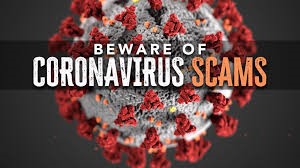Nationwide — It is sad, but true: whenever the nation suffers a crisis, criminals seek to take advantage — and the COVID-19 pandemic is no different. Scammers have exploited the crisis to find new ways to cash in at the expense of residents.
Fraud reports have spiked due to uncertainty surrounding COVID-19, leaving many residents unsure how to avoid scams or report them to authorities. Following are examples of common frauds and tips for recognizing them and avoid being scammed:
Fake at-home COVID-19 testing kits or vaccinations
Scammers may email you or post advertisements on social media promoting remedies to cure or keep you safe from COVID-19. These ads are completely misleading and are tailored to take as much of your money as possible. Moreover, these kits can also negatively impact your health by exposing you to unknown chemicals.
There are no FDA-authorized home test kits or vaccinations for the coronavirus. Visit sites like coronavirus.gov and usa.gov/coronavirus to check for any official medical breakthrough that may occur in the future.
IRS impersonators
You may be contacted by criminals impersonating the IRS who ask about your stimulus check or request your personal information, claiming such information is necessary if you are to receive future financial support. In reality, the IRS will never call you or contact you via email or text.
Do not provide any personal information — especially with credit card or social security numbers — to anyone contacting you regarding your stimulus check. They are only pretending to be the IRS.
Illegal robocalls
Robocalls are often used by scammers to try and sell you phony low-priced health insurance and work-at-home schemes. Hang up immediately on illegal robocalls. Avoid pressing any numbers during the call as that may lead to more robocalls in the future.
Check with your phone service provider to see if they offer any spam call filters, and be sure to also register yourself on the National Do Not Call Registry to reduce robocalls to your phone.
Fake charities
Scammers often pretend to be representatives of a legitimate charity and prey on a person’s goodwill by asking for donations to their cause. They may call or email you for donations with no (or fake) proof of official affiliation to a charity they claim to be representing. By donating, your money will end up in the scammers’ pockets and not with the charity you were hoping to support.
Always do your homework before donating and make sure you only submit funds through the charity’s official channels, such as its website or official address. Never respond to a charity that asks for donations in cash, by gift card, or by wiring money.
It’s important for residents to do their own research, and if any scammers contact you, report their suspicious activity to the Federal Trade Commission at ftccomplaintassistant.gov.






